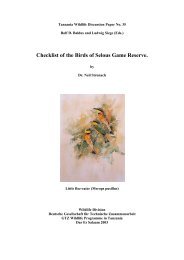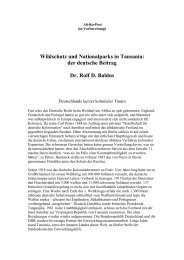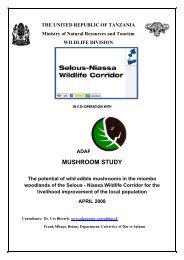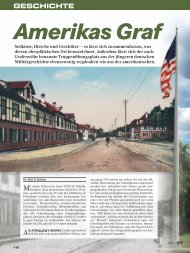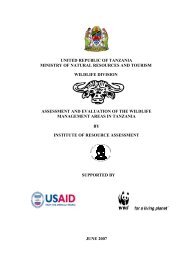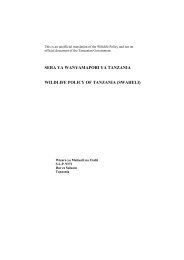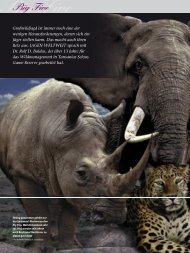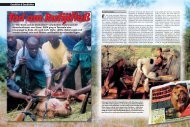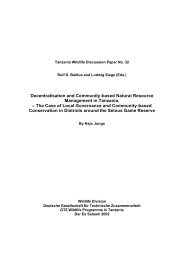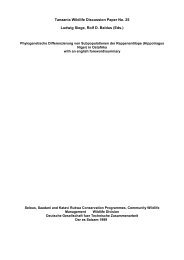African Indaba Articles - wildlife-baldus.com
African Indaba Articles - wildlife-baldus.com
African Indaba Articles - wildlife-baldus.com
Create successful ePaper yourself
Turn your PDF publications into a flip-book with our unique Google optimized e-Paper software.
The Guidelines on Sustainable Hunting in Europe have been prepared by the Wild Species ResourcesWorking Group (WISPER) of the IUCN-SSC European Sustainable Use Specialist Group (ESUSG). Theyaim to apply wider international principles and guidelines for the sustainable use of wild living resources atthe European regional level. The focus is on recreational hunting involving the shooting of birds andmammals. However, much of what is put forward should be applicable in other contexts, such as subsistenceor <strong>com</strong>mercial hunting or hunting with hounds or falcons.The European document provides a non-binding set of guidelines for the sustainable hunting of wild birdand mammal species, generally classified as “game” and as such subject to regulated hunting. The aspect“sustainability” is addressed mainly from an ecological point of view. In addition, the document makes a firstanalysis of certain (<strong>com</strong>bined) socio-economic considerations.The authors of the document state that it would be useful to develop further tools to asses the economicand socio-cultural sustainability of hunting. In case of conflicting interests between the three principals’aspects, resolution of that conflict should be based on the best available science, or otherwise onprofessional management experience. It should however be clear that ecological guidelines should prevail –in other words, if hunting is ecologically unsustainable, this cannot be “<strong>com</strong>pensated” by economicand/or socio-cultural sustainability.You can download the entire document athttp://www.iucn.org/themes/ssc/susg/docs/WISPERguidelines210906_1.pdfResults and Conclusions of the Selous ConservationProgram/Tanzania 1987–2003By Dr Rolf D BaldusDr Baldus examines the crucial role of good governance in ecosystem management in an analysispresented at the Serengeti Conference 2006 (edited for <strong>African</strong> <strong>Indaba</strong>)SummaryBetween 1987 and 2003 the Tanzanian and German Governments jointly implemented the SelousConservation Programme (SCP), for the long-term conservation and sustainable use of the naturalresources, in particular <strong>wildlife</strong>, in the Selous Game Reserve and environs. Its direct objectives were torehabilitate the Selous Game Reserve, to involve the <strong>com</strong>munities in the buffer zones and allow them tomanage <strong>wildlife</strong> and benefit from the sustainable use of natural resources on village land. It was planned,executed and financed in partnership between the Wildlife Division (WD), Deutsche Gesellschaft fürTechnische Zusammenarbeit (GTZ), district administrations and villages around the Selous and otherdonors.At the end of the Programme in 2003 the results were excellent: Overall level of management wassatisfactory, trophy poaching was insignificant and an adequate, secure and long term financial basis was inplace (2.8 million US$ retention per year). Community involvement was well developed and practiced aroundthe Selous, however, only on a pilot basis. The paradigm shift had been accepted and further developed bythe central Government as a national program, called Community Based Conservation (CBC), forconservation outside protected areas and for poverty alleviation within the Poverty Reduction Strategy. Itsimplementation beyond pilot status was delayed by the Wildlife Division, as it would have meant a sharingpower and revenue with the <strong>com</strong>munities.The major problem for the Selous during the time of the SCP was not to raise the reserve’s managementto satisfactory levels, but rather that many relevant decisions, e.g. on hunting quotas, allocation of huntingblocks and tourist lodge sites and on the reserve's budget remained with the Ministry. These importantdecisions were taken without consent or even involvement of the Selous administration and otherstakeholders like the districts and <strong>com</strong>munities concerned. Upon the request of the Government of Tanzaniaand financed by Germany a major reform of the technical administration (database, <strong>com</strong>puterization) of102



